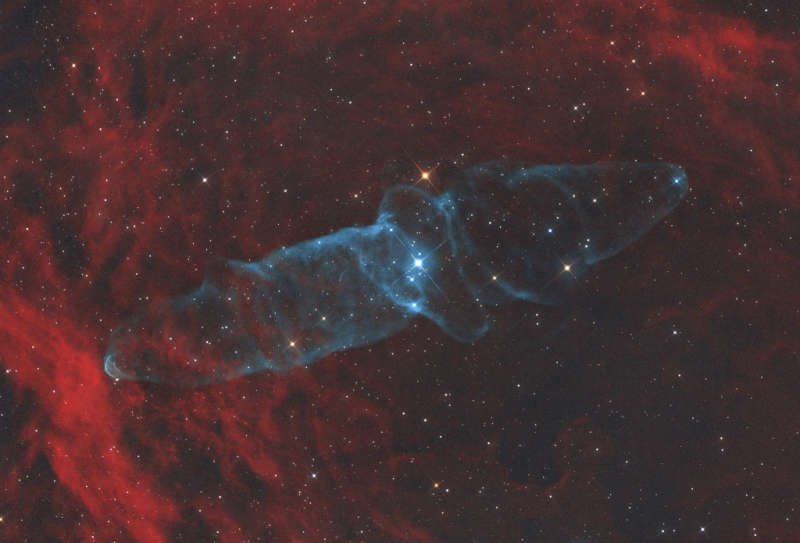
|
Credit & Copyright: Tommy Lease
Explanation:
A mysterious squid-like cosmic cloud, this nebula
is very faint, but also very large in planet Earth's sky.
In the image,
composed with 30 hours of narrowband image data,
it spans nearly three full moons toward the royal constellation Cepheus.
Discovered in 2011 by
French astro-imager
Nicolas Outters,
the Squid Nebula's
bipolar shape is distinguished here
by the telltale blue-green
emission from
doubly ionized oxygen atoms.
Though apparently
surrounded by
the reddish hydrogen emission region Sh2-129,
the true distance and nature of the Squid
Nebula have been difficult to determine.
Still, a more
recent
investigation
suggests Ou4 really does lie
within
Sh2-129
some 2,300 light-years away.
Consistent with that scenario, the cosmic squid
would represent a spectacular outflow of material driven by a
triple system
of hot, massive stars, cataloged as HR8119,
seen near the center of the nebula.
If so, this truly giant squid nebula would physically be over
50 light-years across.
|
January February March April May June July August September October November December |
| |||||||||||||||||||||||||||||||||||||||||||||||||||||||
NASA Web Site Statements, Warnings, and Disclaimers
NASA Official: Jay Norris. Specific rights apply.
A service of: LHEA at NASA / GSFC
& Michigan Tech. U.
Based on Astronomy Picture
Of the Day
Publications with keywords: emission nebula
Publications with words: emission nebula
See also:
- Sharpless 249 and the Jellyfish Nebula
- APOD: 2025 December 17 Á W5: The Soul Nebula
- APOD: 2025 December 9 Á The Heart of the Soul Nebula
- APOD: 2025 September 19 Á The NGC 6914 Complex
- APOD: 2025 September 10 Á The Great Lacerta Nebula
- APOD: 2025 July 21 Á Cats Paw Nebula from Webb Space Telescope
- APOD: 2025 July 16 Á The Rosette Nebula from DECam
